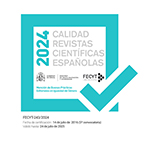El grupo operativo como método participativo: poder y aprendizaje en la relación profesional
Resumen
El presente artículo examina distintas experiencias de observación participante dentro del método de Grupo operativo en la intervención social y en la docencia universitaria. De ellas se pretende extraer claves metodológicas que permitan desarrollar un estilo profesional de Trabajo Social emancipador, esto es, que comprenda y maneje el poder en la relación profesional oponiéndose a un estilo de control. El texto se centra en el análisis teórico y empírico del grupo operativo y los métodos participativos, y su relación con el poder y el aprendizaje. Más que a nivel socio-político, el presente estudio hace hincapié en las prácticas que las/los profesionales desarrollan desde sus respectivos roles de trabajo, ya sea en los Servicios Sociales o en la enseñanza superior. Se destacan como claves metodológicas: el reconocimiento de las distintas subjetividades, la necesidad de una intervención de tipo colectivo, la reflexividad metodológica, el uso de espacios de encuentro y reflexión, el trabajo teórico, el aprendizaje de tipo afectivo, la supervisión profesional, la promoción de relaciones horizontales y el esfuerzo por promover la vinculación y el desarrollo de redes.Descargas
Descarga artículo
Licencia
La revista Cuadernos de Trabajo Social, para fomentar el intercambio global del conocimiento, facilita el acceso sin restricciones a sus contenidos desde el momento de su publicación en la presente edición electrónica, y por eso es una revista de acceso abierto. Los originales publicados en esta revista son propiedad de la Universidad Complutense de Madrid y es obligatorio citar su procedencia en cualquier reproducción total o parcial. Todos los contenidos se distribuyen bajo una licencia de uso y distribución Creative Commons Reconocimiento 4.0 (CC BY 4.0). Esta circunstancia ha de hacerse constar expresamente de esta forma cuando sea necesario. Puede consultar la versión informativa y el texto legal de la licencia.









